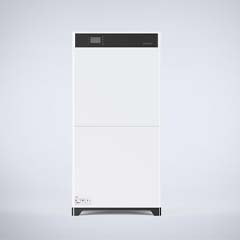How to Achieve Energy Independence with Home Energy Storage Systems
Apr 07, 2025
As global attention on sustainable energy continues to grow, home energy storage systems (ESS) have become an ideal choice for more and more households to achieve energy independence. When combined with solar power, home energy storage systems not only effectively reduce reliance on the power grid but also save on electricity costs, improve energy efficiency, and contribute to environmental protection.
What is a Home Energy Storage System?
A home energy storage system is an efficient device that stores and manages electricity for the household, usually used in conjunction with a solar power system. Solar panels convert sunlight into electricity, and when the energy produced exceeds the household's demand, the excess power is stored in a storage battery. When electricity demand exceeds solar generation, the stored energy is released, ensuring the household's energy self-sufficiency.
This system can effectively reduce a household’s reliance on the external power grid, providing a more flexible and efficient power usage solution and making it an effective tool for achieving energy independence.
Main Advantages of Home Energy Storage Systems
1. Backup Power Supply
In the event of a power outage or unstable power supply, a home energy storage system can provide backup power, ensuring the normal operation of household devices. Especially during high power demand periods, the storage system can ensure continuous power for daily household needs, avoiding the inconvenience caused by power outages.
Additionally, when combined with solar power generation, the home energy storage system can operate off-grid, further reducing dependence on the power grid.
2. Suitable for 99% of Traditional Household Appliances
Home energy storage systems come in a variety of power models, making them suitable for a range of traditional household appliances. Whether it's kitchen appliances, televisions, air conditioners, or power tools, the storage system can meet the household's energy needs. Depending on electricity consumption, users can choose an appropriate storage system to ensure that household devices operate normally under all circumstances.
3. Electric Vehicle Charging Support
With the increasing popularity of electric vehicles, many households have started using electric cars for daily transportation. Home energy storage systems support electric vehicle charging, providing clean energy to charge electric cars and reducing dependence on public charging facilities. By utilizing solar power generation and storage systems, households can charge their electric vehicles more economically and environmentally.
4. Integration with Solar Power Systems
Home energy storage systems are typically used in combination with solar power systems to maximize solar energy utilization. These systems integrate technologies such as inverters, battery management systems (BMS), Wi-Fi, and RS485 modules to ensure efficient power management. During the day, the electricity generated by solar power is used by the household, and any excess is stored in the storage battery. At night or on cloudy days, the stored energy is released to ensure stable electricity for the household.
Moreover, home energy storage systems can serve as a backup power supply when the grid is insufficient, preventing inconvenience due to power shortages.
Working Principles of Home Energy Storage Systems
The working principle of a home energy storage system is simple yet efficient and mainly involves the following steps:
Solar Power Generation: Solar panels convert sunlight into direct current (DC) electricity for household use.
Power Conversion: An inverter converts DC electricity into alternating current (AC) electricity for household appliances.
Energy Storage: Excess electricity is stored in the storage battery through the inverter. Once the battery is full, the remaining power is kept as backup to ensure future demand is met.
Intelligent Management: Modern home energy storage systems are typically equipped with intelligent energy management systems (EMS) that can monitor the generation, storage, and usage of electricity in real-time. These systems automatically adjust the battery’s charge and discharge cycles to ensure optimal utilization of electricity.
With technological advancements, some systems have evolved into Intelligent Energy Storage Systems, which, through more intelligent management and monitoring, enhance overall efficiency and operational convenience.
How to Choose the Right Home Energy Storage System?
Selecting the right home energy storage system is crucial for achieving energy independence. Here are some important factors to consider when choosing a system:
1. Storage Capacity
Storage capacity is one of the most important factors when choosing a home energy storage system. The capacity of the storage system should be selected based on the household's electricity needs. If the household generates a significant amount of solar energy during the day, the stored power will support energy usage during the evening or on cloudy days, ensuring no reliance on the grid.
2. Battery Type
Currently, there are two common types of storage batteries in the market: lead-acid batteries and lithium-ion batteries. Lithium-ion batteries have higher energy density, longer lifespan, and better charge/discharge efficiency, making them the mainstream choice for home energy storage systems. Although the initial investment is higher, lithium-ion batteries offer better cost-effectiveness in the long run.
3. Compatibility with Solar Power Systems
Ensuring that the storage system is compatible with the existing solar power system is a key factor when choosing a system. Many Solar Energy Storage Systems are compatible with different brands of solar panels and inverters, ensuring the system's stability and reliability.
4. Intelligent Energy Management
Choosing a storage system equipped with an intelligent energy management system (EMS) enables real-time monitoring of the power flow, optimizing the battery's charge and discharge cycles to maximize electricity usage efficiency. These systems can intelligently adjust the flow of electricity, distributing energy based on real-time demand, making the household’s energy use more efficient.
Home energy storage systems provide an efficient and reliable energy management solution for households. Not only can they ensure backup power during shortages, but they can also optimize energy usage through intelligent management, reducing electricity costs and increasing energy independence. As technology continues to improve, the environmental and economic benefits of home energy storage systems are becoming increasingly apparent.
If you are looking for an efficient home energy storage system with intelligent management features, Enecell, as a professional Solar Energy Storage System Manufacturer, offers a full range of residential and commercial energy storage solutions, customized to meet your needs, helping you achieve a green and sustainable energy lifestyle.



